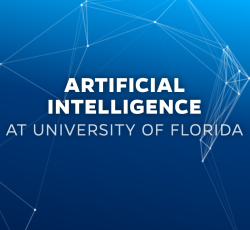AI Advances and Applications Virtual Seminar Series – AI Research Catalyst Fund Awardees

- This event has passed.
AI Advances and Applications Virtual Seminar Series – AI Research Catalyst Fund Awardees
October 20, 2022 @ 12:00 pm - 1:00 pm

New AI Advances and Applications Virtual Seminar Series starting Fall 2021:
AI Research Catalyst Fund Awardees
Artificial Intelligence (AI) is the next horizon in computational-enabled science and technologies. Efforts to develop and apply robust AI are ongoing across almost all fields of study. Among other benefits, AI promises to revolutionize healthcare, security, transportation, education, manufacturing and the overall human experience. Algorithmic advances in machine learning (ML) along with increased computing power and the advent of “big data” have set AI up to be one of the most powerful technological forces of the 21st century.
The University of Florida has launched a major initiative to engage intellectual interest in AI with the objective of becoming a national leader in AI research and education. As part of this initiative, the AI Research Catalyst Fund is intended to jump start research and collaboration in AI and promote the use of UF’s new computing infrastructure, utilizing GPU technology on the HiPerGator research computing system with an eye towards implementation of new capabilities soon to be installed.
The AI Research Catalyst Fund Awardees are developing projects that: strive to develop new machine-learning and deep-learning algorithms; use AI/ML to develop ways of analyzing heterogeneous data or novel methods for analyzing existing datasets; introduce AI and ML to investigators with little experience in AI/ML; and address foundational issues in AI, its applications to science and engineering problems, and its impacts to society.
Wednesdays, 12:00PM – 1:00PM Via Zoom
SPRING 2022
Feb. 2, 2022: Hassan Azad “Application of Machine Learning in the Prediction and Modeling of Environmental Noise” Registration Here.
Feb. 16, 2022:: Shreya Saxena “Explainable AI for Elucidating the Neural Control of Movement” Registration Here.
**Feb. 24, 2022 (Thursday): Hongcheng Liu “Almost Dimension-Free Algorithms for Black-Box Optimization with Applications in Training Traffic Monitoring AIs“ Registration Here.
Mar. 2, 2022: Robert Guralnick “Using AI to Uncover Decades of Global Ecological Change“ Registration Here .
Mar. 16, 2022: Aline Zare “Parasitic Nematode Identification with Deep Learning” Registration Here.
Mar. 23, 2022: Wanli Xing “Research and Development for Fair AI in Education through Supercomputing” Registration Here.
Mar. 30, 2022: Peng Liu [PI: Ruogu Fang] Postponed until Fall 2022
Apr. 6, 2022: Angelos Barmpoutis “Analyzing Dance Moves Across Cultures Using AI-Driven Movement Classification” Registration Here.
Apr. 13, 2022: Eric Triplett “Deep Learning Prediction of Autoimmune Disease from Early Childhood Gut Microbiome Composition“” Registration Here
Oct. 20, 2022: Peng Liu [PI: Ruogu Fang] “Brain-Inspired AI for Human Emotion Understanding and Modeling,” Registration Here
FALL 2021
Sept. 1, 2021: Yiming Xu [PI Xilei Zhao] “Real-time Forecasting of Dockless Scooter-Sharing Demand: A Context-Aware Spatio-Temporal Multi-Graph Convolutional Network Approach” Register Here.
Sept. 15, 2021: Parker Kotlarz [PI Juan Claudio Nino] “AI-Enabled Imaging Biomarker Identification for Early Detection and Treatment of Alzheimer’s Disease” Register Here.
Sept. 22, 2021: Steven Weisberg “What mind matters? Machine learning approaches to linking structural variation in the brain to individual differences in spatial behavior” Register Here.
Oct. 13, 2021: Chenglong Li “A Machine Learning Approach to Drug Hit Optimization” Register Here.
Oct. 27, 2021: Ray Huffaker “Symbiosis of machine learning, nonlinear time series analysis, and novel supercomputing to reconstruct soil-biome nonlinear dynamics from field and remote-sensing large data” Register Here.
Nov. 3, 2021: Salil Bavdekar [PI Ghatu Subhash] “AI-Assisted Accelerated Discovery of Novel Materials for High-Strain-Rate Applications” Register Here.
Nov. 10, 2021: Huan Chen “Fairness in Information Access through Culturally Competent AI Systems” Register Here.
Nov. 17, 2021: Emre Tepe “Spatio-Temporal Modeling of Land-Use Changes Using Big Data” Register Here.
Dec. 1, 2021: Brian Odegaard “Combining Deep Neural Networks and Large-Scale Brain Data to Predict Human Cognition and Behavior” Register Here.
Dec. 8, 2021: Qing Lu “A Kernel Neural Network for High-dimensional Genomic Risk Prediction” Register Here.
For a listing of UF Research Catalyst Fund Awardees who will be presenting their research, click here.
To learn more, visit https://news.ufl.edu/2020/12/artificial-intelligence-research-catalyst-fund-/.
Main UF AI webpage:https://ai.ufl.edu
Additional articles: https://news.ufl.edu/2021/04/hipergator-symposium-highlights-ai-research/

